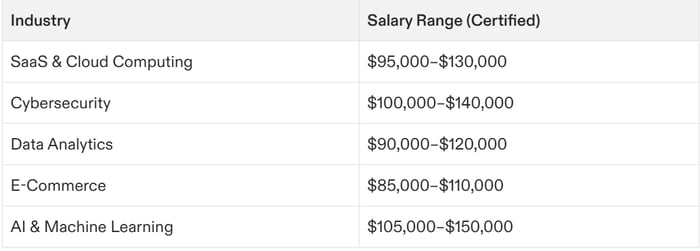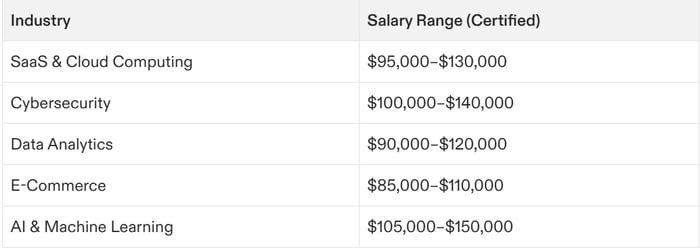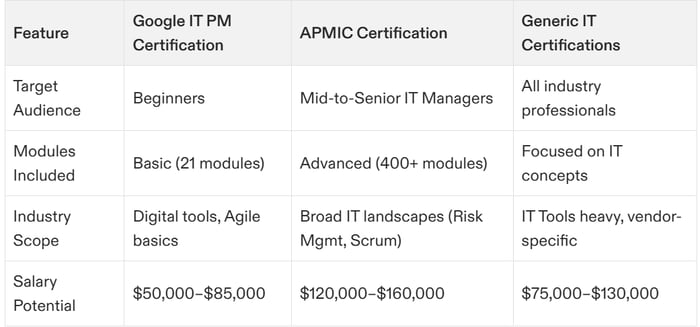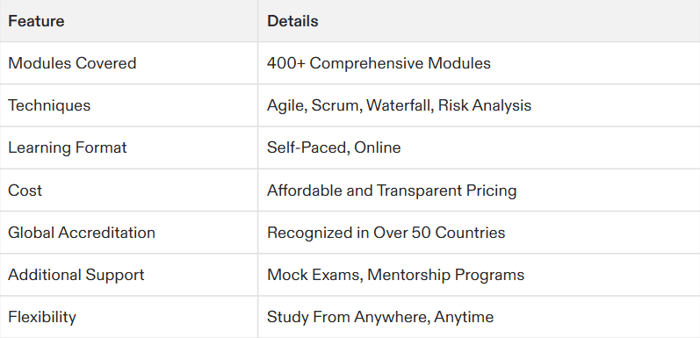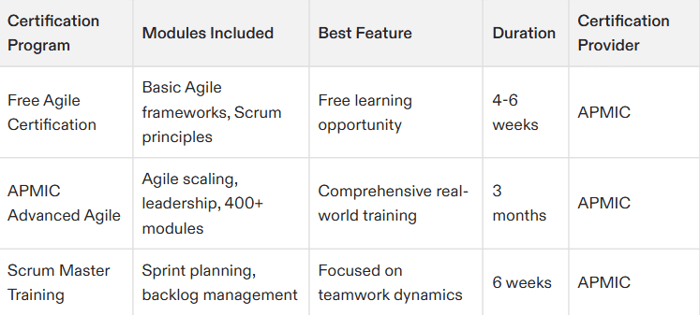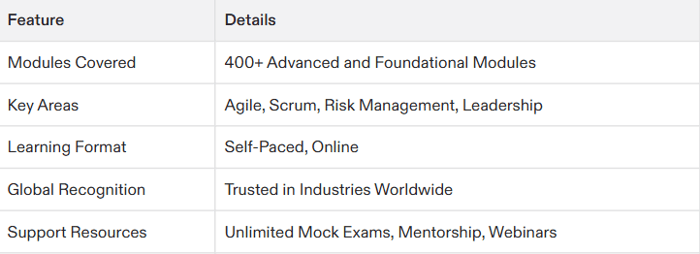Table of Contents
- Introduction
- What is a Project Management Certification in IT?
- Benefits of IT-Specific Certification
- Salary Prospects with Project Management Certification IT
- Industry Breakdown
- Key Differences Between Google, APMIC, and IT Certifications
- Frequently Asked Questions (FAQ)
- APMIC Certification
- Final Thoughts
Introduction
The world of project management has evolved rapidly with the advent of technology. Nowhere is this more evident than in the IT sector, where skilled project managers are crucial for overseeing complex systems, agile developments, and digital transformations. Obtaining a project management certification IT can be a game-changer. Not only does it validate your skills, but it also makes you a more competitive candidate in a field where demand continues to exceed supply. From mastering agile practices to managing high-stakes IT projects, this certification equips you with everything needed to excel in the tech-driven era.
This blog will cover everything you need to know about project management certification IT—what it includes, why it matters, salary insights, and how it compares to advanced options like APMIC Certification.
Contents:
- What is a Project Management Certification in IT?
- Benefits of IT-Specific Certification
- Salary Prospects with Project Management Certification IT
- Key Differences Between Google, APMIC, and IT Certifications
- Frequently Asked Questions (FAQ)
What is a Project Management Certification in IT?
A project management certification IT provides specialized training in managing projects tailored for the information technology sector. The certification focuses on methodologies, tools, and frameworks critical to overseeing IT projects’ unique demands, such as adapting to evolving tech trends, ensuring data security, and implementing agile strategies.
This type of certification is designed for IT professionals and generalists looking to pivot into tech-related project management roles. While general project management certifications cover standard methodologies, the IT-specific certification dives deeper into tools like Jira, cloud infrastructure management, and DevOps practices.
Popular certifications include PMP for IT, ITIL, and more advanced programs like the APMIC Certification. Each offers unique benefits, depending on your career stage and goals.
Benefits of IT-Specific Certification
1. Tailored to the IT Sector’s Needs
Unlike general certifications, a project management certification IT course focuses on IT ecosystems. You’ll learn to tackle real-world challenges such as cybersecurity measures, cloud migrations, and scaling IT teams using agile frameworks.
2. Higher Employability
IT giants, SaaS companies, and startups prefer certified project managers. This qualification showcases your adaptability and your ability to handle niche projects requiring both managerial and technical expertise.
3. Improved Salary Prospects
Earning a certification can lead to impressive salary bumps. Certified IT project managers earn significantly more than their uncertified peers.
4. Access to Advanced Tools
Training in platforms like Jira, Trello, Azure DevOps, and Confluence ensures you stay at the forefront of IT-specific tools.
5. Preparation for Leadership Roles
Looking to become more than just a project manager? Advanced certifications like APMIC prepare you for leadership positions by enhancing your skills in big-picture planning, risk mitigation, and stakeholder management.
Salary Prospects with Project Management Certification IT
How much can you earn with a project management certification IT? It varies greatly depending on your location, experience, and the value employers place on your certification. Here’s an overview to guide your decisions.
Entry-Level IT Project Managers
For professionals new to IT project management, the certification proves foundational skills and opens doors to roles like IT Project Coordinator or Junior IT Project Manager. Salaries typically range from $65,000 to $85,000 annually.
Mid-Level Professionals
Mid-level managers applying IT certifications grow quickly in salary and responsibilities. Certified IT project professionals with 3–5 years of experience can negotiate salaries of $90,000 to $120,000 annually, particularly in tech-heavy regions like Silicon Valley or Austin.
Advanced Roles
Certifications like the APMIC Certification—recognized for its comprehensive 400+ modules—equip managers for leadership roles such as IT Director or VP of IT Projects. These certifications often help professionals achieve salaries ranging from $130,000 to $160,000.
Pro Tip: Employers in industries related to cybersecurity or SaaS products particularly value certified managers for their ability to execute cost-effective, security-conscious projects in dynamic environments.
Industry Breakdown
Key Differences Between Google, APMIC, and IT Certifications
When it comes to selecting the right certification for a career in IT project management, professionals face numerous options. Each certification type caters to a specific audience, offering unique benefits and career outcomes. Here’s a detailed analysis of how Google, APMIC, and other IT-specific certifications stack up against each other in the context of the IT industry.
Google Certifications
Google’s project management certifications are ideal for those taking their first step into the world of project management. Their focus is primarily on fundamental project management principles, digital tools, and agile methodologies, making them a popular choice for beginners. However, they lack the depth necessary for managing complex IT projects or advancing to senior managerial roles.
These certifications are affordable and accessible, making them an excellent entry point for fresh graduates, career changers, and those looking to build foundational knowledge in project management. For IT professionals aspiring to leadership positions or tackling advanced industry challenges, however, the scope may feel limited.
APMIC Certification
The APMIC Certification is considered one of the most advanced and comprehensive certifications available, especially for IT project management professionals aiming for mid- to senior-level positions. With over 400 modules, it offers unparalleled depth across various topics, including cloud infrastructure, cybersecurity measures, and agile IT frameworks.
Unlike Google’s certification, APMIC dives deep into specialized IT management areas like DevOps practices, IT risk management, and high-stakes leadership challenges. Its flexibility and customizability help mid-level managers transition into high-paying roles like IT Directors or CIOs. For IT professionals focused on scalability, global recognition, and mastering advanced tools, this certification consistently stands out.
APMIC also stands apart for its extensive industry recognition. IT companies worldwide value the program’s ability to create highly skilled professionals ready to lead large-scale transformational projects.
IT-Specific Certifications
IT-focused project management certifications like ITIL, CAPM, or PMP tailored for IT offer a middle ground. They emphasize IT tools, specific IT challenges, and adaptability in technical ecosystems. While these certifications often focus on specific areas like service management or vendor processes, their scope can sometimes be narrower than what APMIC offers.
For professionals already working in IT but seeking to add meaningful project management skills to their repertoire, these certifications serve as a stepping stone. However, they may not provide the holistic, leadership-driven training necessary for top-tier managerial roles.
Maintaining technical expertise while gaining project leadership skills is a vital focus of these certifications. They are often considered by IT specialists transitioning into project management without the need for a generalist certification like Google’s or a highly advanced one like APMIC’s.
Choosing the Right Fit
Selecting the right certification depends on your career stage, goals, and the specific roles you envision in the IT sector. While Google certifications are great for beginners, IT-specific certifications cater to professionals focused on niche IT tools or workflows. However, for those looking to amplify their leadership skills and unlock global opportunities, APMIC Certification remains the ultimate choice.
Here’s a comparison table summarizing the distinctions:
Frequently Asked Questions (FAQ)
1. What is the value of a project management certification IT in 2025?
IT certifications are gaining traction as industries increasingly focus on cybersecurity, cloud computing, and agile methodologies. The value lies in how prepared you are for these evolving needs.
2. Which certification is best for IT professionals?
While Google’s IT program works for beginners, advanced certifications like APMIC are ideal for professionals aiming for leadership roles and higher salaries.
3. Can IT certifications increase my salary?
Yes! Depending on your experience and the certification type, you can achieve salary hikes of 10–50%.
4. How long does it take to complete an IT-specific project management certification?
Programs vary. Google’s certification can take 6 months, whereas APMIC offers flexible durations depending on the selected modules.
5. Are IT certifications valid internationally?
Yes, most IT-specific certifications, especially APMIC, are recognized globally, making them valuable across different economies.
APMIC Certification
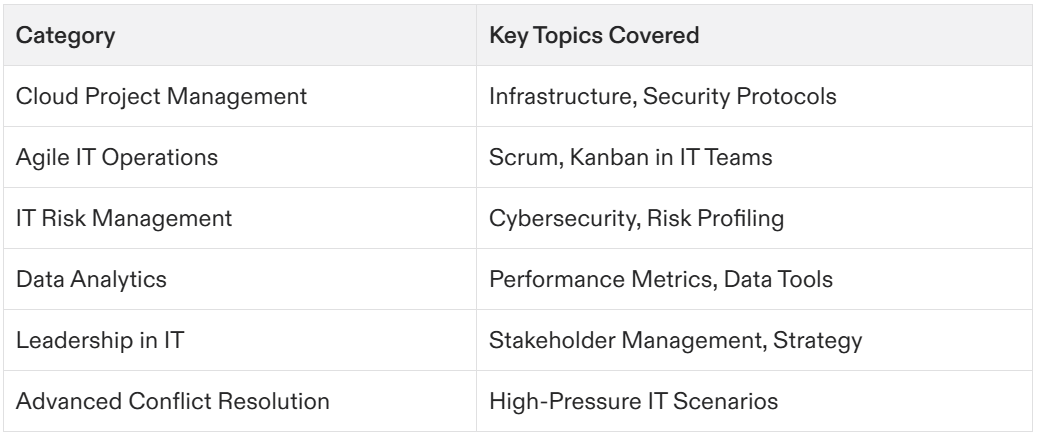 APMIC’s well-rounded certification enables candidates to master IT project management, from startup environments to global enterprises.
APMIC’s well-rounded certification enables candidates to master IT project management, from startup environments to global enterprises.
Final Thoughts
The right project management certification IT can shape your career trajectory. While general programs like Google’s cater to entry-level needs, advanced certifications, including the APMIC Certification, prepare you for long-term success and high-paying roles in IT.
When planning your next career step, invest in certifications that align with both your current skill level and future ambitions. With strategic planning and the right credentials, the IT project management world is yours to conquer!

